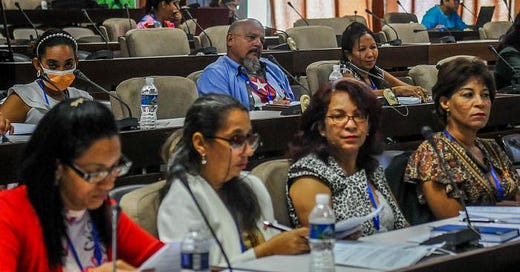The First Ordinary Session of the Tenth Legislative Assembly of People’s Power was held at the Palace of Conventions in Havana on July 22-23, 2023. So-called for its being the tenth legislative assembly to be constituted since the system of people’s power was established by the Cuban Constitution of 1976. Each legislative assembly has a term of five years; it meets regularly in ordinary sessions, and extraordinary sessions can be convoked as there is need. The July 22-23 ordinary session was the first in the current legislature’s term.
The Tenth Legislative Assembly was established by the elections of 2022-2023. Some 55% of the 470 deputies are women, 45% are blacks and mulattos, and 95% are college graduates. All sectors of the society are represented, including production, service, the press, education, health, science, culture, sport, students, religion, the military, and owners of small-scale private enterprises. Voter participation rate in the first stage of the e…


